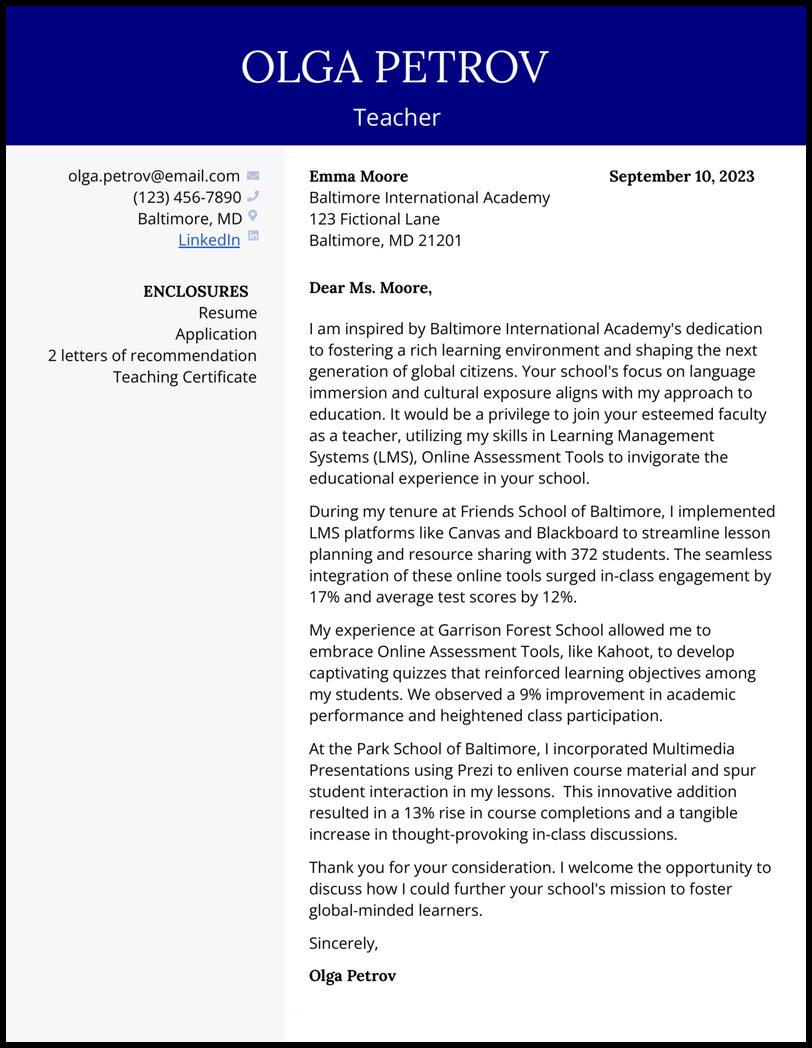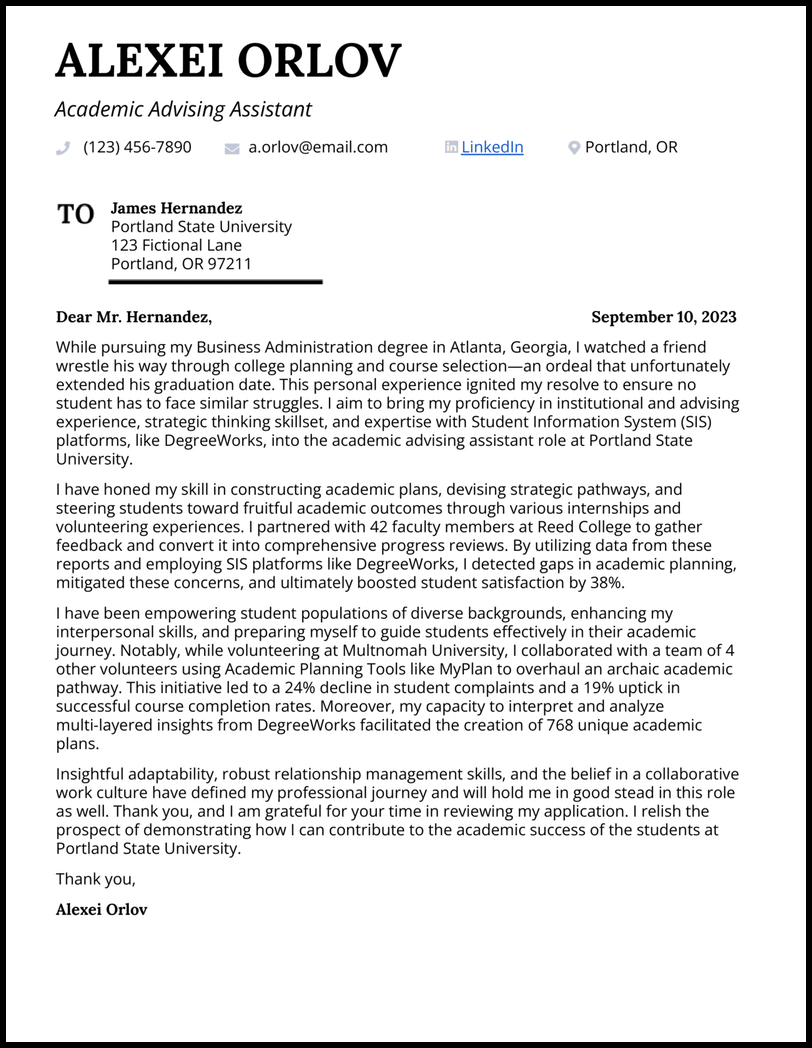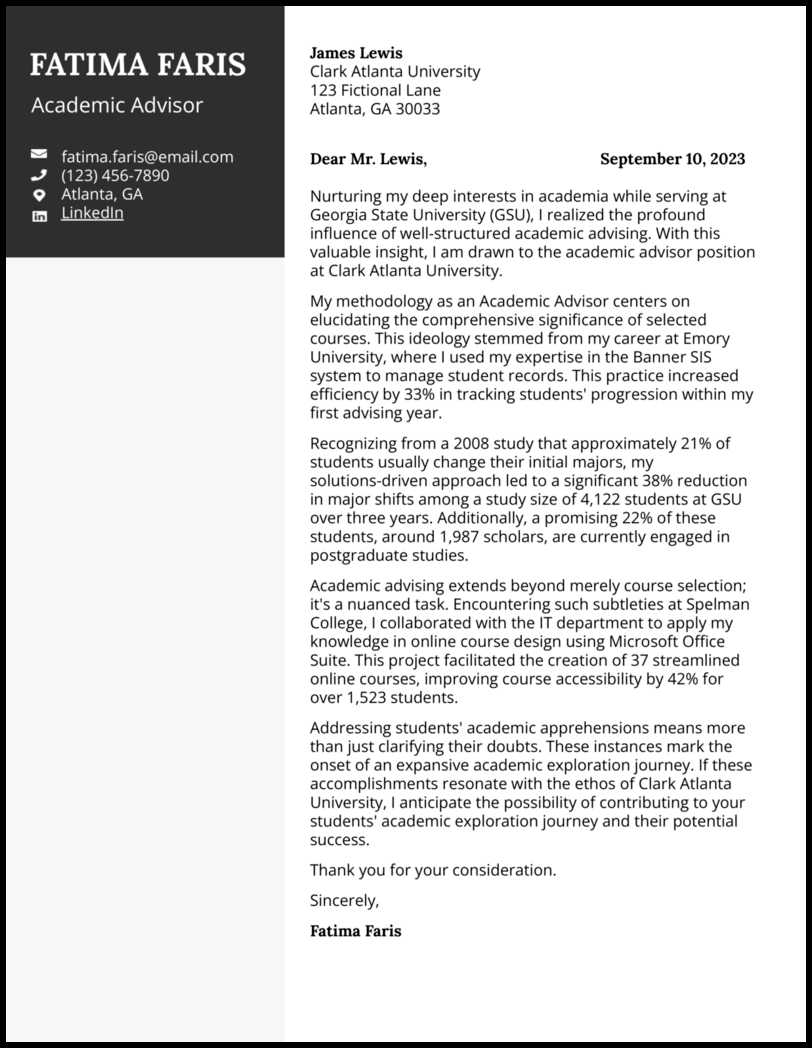




Whether you work as a teacher or an academic advisor, your students know they can count on you to answer their questions and assist them with paperwork. You also process student records and monitor academic progress to provide personalized advice for student success.
But how can you write a cover letter that’s as pleasant and user-friendly as those syllabus guides you hand out?
Don’t worry! We’ve been helping academic professionals find their dream jobs for years. And with our five academic cover letter examples and free AI cover letter generator, you’ll be all set for success!
Copy this text for your academic cover letter!
123 Fictional Avenue
Austin, TX 76208
(123) 456-7890
September 10, 2026
Emma Moore
Baltimore International Academy
123 Fictional Lane
Baltimore, MD 21201
Dear Ms. Moore,
I am inspired by Baltimore International Academy’s dedication to fostering a rich learning environment and shaping the next generation of global citizens. Your school’s focus on language immersion and cultural exposure aligns with my approach to education. It would be a privilege to join your esteemed faculty as a teacher, utilizing my skills in Learning Management Systems (LMS), online assessment tools to invigorate the educational experience in your school.
During my tenure at Friends School of Baltimore, I implemented LMS platforms like Canvas and Blackboard to streamline lesson planning and resource sharing with 372 students. The seamless integration of these online tools surged in-class engagement by 17% and average test scores by 12%.
My experience at Garrison Forest School allowed me to embrace online assessment tools, like Kahoot, to develop captivating quizzes that reinforced learning objectives among my students. We observed a 9% improvement in academic performance and heightened class participation.
At the Park School of Baltimore, I incorporated multimedia presentations using Prezi to enliven course material and spur student interaction in my lessons. This innovative addition resulted in a 13% rise in course completions and a tangible increase in thought-provoking in-class discussions.
Thank you for your consideration. I welcome the opportunity to discuss how I could further your school’s mission to foster global-minded learners.
Sincerely,
Olga Petrov
Enclosures:
Resume
Application
2 letters of recommendation
Teaching Certificate
Why this cover letter works
- When filling this position, the hiring manager envisions a candidate passionate about education and with a proven track record of fostering a nurturing environment for young minds. Make sure your academic cover letter ticks these boxes.
- In line with the demands of modern learning, demonstrate expertise in various learning management, assessment, and presentation tools like Kahoot, Blackboard, and Prezi.
Level up your
cover letter game
Relax! We’ll do the heavy lifting to write your cover letter in seconds.
Copy this text for your academic advisor no experience cover letter!
123 Fictional Avenue
Portland, OR 97211
(123) 456-7890
September 10, 2026
James Hernandez
Portland State University
123 Fictional Lane
Portland, OR 97211
Dear Mr. Hernandez,
While pursuing my business administration degree in Atlanta, Georgia, I watched a friend wrestle his way through college planning and course selection—an ordeal that unfortunately extended his graduation date. This personal experience ignited my resolve to ensure no student has to face similar struggles. I aim to bring my proficiency in institutional and advising experience, strategic thinking skillset, and expertise with Student Information System (SIS) platforms, like DegreeWorks, into the academic advising assistant role at Portland State University.
I have honed my skills in constructing academic plans, devising strategic pathways, and steering students toward fruitful academic outcomes through various internships and volunteering experiences. I partnered with 42 faculty members at Reed College to gather feedback and convert it into comprehensive progress reviews. By utilizing data from these reports and employing SIS platforms like DegreeWorks, I detected gaps in academic planning, mitigated these concerns, and ultimately boosted student satisfaction by 38%.
I have been empowering student populations of diverse backgrounds, enhancing my interpersonal skills, and preparing myself to guide students effectively in their academic journey. Notably, while volunteering at Multnomah University, I collaborated with a team of 4 other volunteers using academic planning tools like MyPlan to overhaul an archaic academic pathway. This initiative led to a 24% decline in student complaints and a 19% uptick in successful course completion rates. Moreover, my capacity to interpret and analyze multi-layered insights from DegreeWorks facilitated the creation of 768 unique academic plans.
Insightful adaptability, robust relationship management skills, and the belief in a collaborative work culture have defined my professional journey and will hold me in good stead in this role as well. Thank you, and I am grateful for your time in reviewing my application. I relish the prospect of demonstrating how I can contribute to the academic success of the students at Portland State University.
Thank you,
Alexei Orlov
Why this cover letter works
- Reminiscing how a personal experience sparked your professional journey and emphasizing your readiness to add value to the institution paints a picture of a passionate candidate.
- Even without formal experience, highlight the impacts you facilitated when interning or volunteering. Then conclude your academic advisor no experience cover letter by reinstating your interest in the role and requesting further discussion.
Copy this text for your academic advisor cover letter!
123 Fictional Avenue
Atlanta, GA 30033
(123) 456-7890
September 10, 2026
James Lewis
Clark Atlanta University
123 Fictional Lane
Atlanta, GA 30033
Dear Mr. Lewis,
Nurturing my deep interests in academia while serving at Georgia State University (GSU), I realized the profound influence of well-structured academic advising. With this valuable insight, I am drawn to the academic advisor position at Clark Atlanta University.
My methodology as an academic advisor is centered on elucidating the comprehensive significance of selected courses. This ideology stemmed from my career at Emory University, where I used my expertise in the Banner SIS system to manage student records. This practice increased efficiency by 33% in tracking students’ progression within my first advising year.
Recognizing from a 2008 study that approximately 21% of students usually change their initial majors, my solutions-driven approach led to a significant 38% reduction in major shifts among a study size of 4,122 students at GSU over three years. Additionally, a promising 22% of these students, around 1,987 scholars, are currently engaged in postgraduate studies.
Academic advising extends beyond merely course selection; it’s a nuanced task. Encountering such subtleties at Spelman College, I collaborated with the IT department to apply my knowledge in online course design using Microsoft Office Suite. This project facilitated the creation of 37 streamlined online courses, improving course accessibility by 42% for over 1,523 students.
Addressing students’ academic apprehensions means more than just clarifying their doubts. These instances mark the onset of an expansive academic exploration journey. If these accomplishments resonate with the ethos of Clark Atlanta University, I anticipate the possibility of contributing to your student’s academic exploration journey and their potential success. Thank you for your consideration.
Sincerely,
Fatima Faris
Why this cover letter works
- Academic advising isn’t merely a 9-5 job; it’s a calling. So, let your academic advisor cover letter emphasize your enthusiasm for the role and showcase your ability to smoothen students’ academic trajectory.
- This example takes it a notch higher with statistics unique to the potential employer’s sector, accomplishments supported by concrete numbers, and prowess in tools like the Banner SIS system.
Copy this text for your academic librarian cover letter!
123 Fictional Avenue
Albuquerque, NM 87101
(123) 456-7890
October 20, 2026
Lucas Scott
Sandia National Laboratories
123 Fictional Lane
Albuquerque, NM 87101
Dear Mr. Scott,
The mission at Sandia National Laboratories to push the envelope in scientific discovery and technological innovation mirrors my zeal for empowering the scholarly community. As an academic librarian, I view my position not merely as a guardian of information but as an enabler that equips researchers with essential tools and resources to advance their projects. My commitment to building bridges of collaboration and improving access to scholarly content echoes Sandia’s dedication to the forefront of innovation.
My leadership role at Alamosa in transforming over 51 unique texts to digital form led to an impressive 33% surge in the accessibility of online resources. Under my guidance, adopting the Evolve Library classification system cut down search durations by nearly a quarter, while my mentorship of a team of 11 librarians amplified our efficiency and service quality.
As an acquisition librarian at the University of New Mexico, my initiative to analyze resource usage boosted material engagement by 18%, added over 12,000 new digital titles to our collection, and slashed the acquisition process time by almost two weeks. These accomplishments showcase my knack for aligning library assets with the demands of academic research.
Additionally, my role as a cataloging expert at the New Mexico State Library honed my skills in MARC21, Libris Alma, and OPAC, ensuring the streamlined operation of library systems. My expertise aims to sustain seamless access to library services, weaving resources into educational programs, and promoting information literacy among the academic populace.
With an eager heart, I am keen to bring my rich background in library services, my enthusiasm for innovation, and my unwavering commitment to academic excellence to the team at Sandia National Laboratories. I am enthusiastic about contributing to your mission and exploring how my skills and experiences can further enrich your team. Thank you for considering my application, and I am excited about the opportunity to discuss how we can collaborate for mutual success.
Sincerely,
Zoe Fischer
Enclosures:
Resume
Transcript
2 letters of recommendation
Why this cover letter works
- We know, job hunting can be grueling, but you can ensure it doesn’t bleed you dry. The trick? Wrap up your academic librarian cover letter by presenting an offer so compelling that the recruiter will think twice about giving you the cold shoulder.
- Zoe, for example, highlights an eagerness to bring their rich background in library services, enthusiasm for innovation, and unwavering commitment to academic excellence to the hiring company’s team, signaling to the potential employer she’s a valuable addition to the crew.
Copy this text for your academic journal cover letter!
123 Fictional Avenue
Atlanta, GA 30033
(123) 456-7890
October 20, 2026
Lucas Scott
Sandia National Laboratories
123 Fictional Lane
Albuquerque, NM 87101
Dear Mr. Scott,
The mission at Sandia National Laboratories to push the envelope in scientific discovery and technological innovation mirrors my zeal for empowering the scholarly community. As an academic librarian, I view my position not merely as a guardian of information but as an enabler that equips researchers with essential tools and resources to advance their projects. My commitment to building bridges of collaboration and improving access to scholarly content echoes Sandia’s dedication to the forefront of innovation.
My leadership role at Alamosa in transforming over 51 unique texts to digital form led to an impressive 33% surge in the accessibility of online resources. Under my guidance, adopting the Evolve Library classification system cut down search durations by nearly a quarter, while my mentorship of a team of 11 librarians amplified our efficiency and service quality.
As an acquisition librarian at the University of New Mexico, my initiative to analyze resource usage boosted material engagement by 18%, added over 12,000 new digital titles to our collection, and slashed the acquisition process time by almost two weeks. These accomplishments showcase my knack for aligning library assets with the demands of academic research.
Additionally, my role as a cataloging expert at the New Mexico State Library honed my skills in MARC21, Libris Alma, and OPAC, ensuring the streamlined operation of library systems. My expertise aims to sustain seamless access to library services, weaving resources into educational programs, and promoting information literacy among the academic populace.
With an eager heart, I am keen to bring my rich background in library services, my enthusiasm for innovation, and my unwavering commitment to academic excellence to the team at Sandia National Laboratories. I am enthusiastic about contributing to your mission and exploring how my skills and experiences can further enrich your team. Thank you for considering my application, and I am excited about the opportunity to discuss how we can collaborate for mutual success.
Sincerely,
Zoe Fischer
Enclosures:
Resume
Transcript
2 letters of recommendation
Why this cover letter works
- Take it from us: If your academic journal cover letter isn’t a vision of loveliness right off the bat, there’s not a snowball’s chance in hell the recruiter will choose you to fill that open journal editor position, even if you’re the crème de la crème. Your piece should not only read well but also look the part.
- Selecting a visually appealing template is a hard and fast rule of writing a job-winning cover letter—think of a two-column layout (the bigger chunk for your narration and a slim one for your contact deets and enclosures) and larger bolded fonts to accentuate key sections. And don’t be shy to use color to make your masterpiece pop; for instance, a vibrant orange for your second name.
Related cover letter examples
How to Format an Academic Cover Letter

Make sure you’re writing your cover letter to the place where you’re applying and not just anywhere. Address the institution by name somewhere in your letter and hearken to their values with keywords inspired by the job ad and About page.
You’ll also want to provide details about your qualifications that specifically match the job description. If you have what they’re looking for, like a background in IT, make sure you mention it.

Academic cover letter introduction
As with any letter, you’ll need to address your academic cover letter to someone by name! It might take a bit of homework to research who that is, but it’s worth the extra effort. No one wants to see another “To Whom It May Concern” letter!
You’ll need a good hook, too, so don’t give away all your best qualities right away. Not only should this paragraph be sleek and powerful, but you’ll want to allude to the fact that you also have more abilities, fostering an interest in learning more.
When you state that you’re the right fit for the job, give a cursory overview of why. What notable schools or projects have you worked with? Where’s the best overlapping area where you can establish a connection with the company? Your cover letter should lay out what qualifications you have and how they benefit the organization.
And stay formal, too! Match the vibe of the institution instead of coming off as too informal and unenthusiastic:
Uh-oh!
Hi, I can’t wait to get started working for your company. There’s plenty of stuff I’ve done that makes me good.
It’s way better to address the institution (and letter recipient!) by name and connect with the values they represent, like in this opener:
That’s much better!
Dear Mr. Lewis,
Nurturing my deep interests in academia while serving at Georgia State University (GSU), I realized the profound influence of well-structured academic advisement. With this new and valuable insight, I am eager to elevate the faculty at Clark Atlanta University through the academic advisor position.

Academic cover letter body
Now that you’ve laid down a solid foundation for qualifications and left the reader wanting more, it’s time to deliver! What have some of your greatest academic successes been?
Recruiters and hiring managers need to see that you’ve already made a positive impact in your field. Your body paragraphs should each contain one main point about your qualifying experiences that have left a measurable impact. The overall body of your cover letter should tell a story of how you’ve become increasingly able to pave the way for academic excellence.
What kinds of GPA improvements, personal ratings, or boosts in overall department or school ratings can you cite as quantifiable metrics for your success? Make sure you work in a smooth reference to an impressive extra certification or two if you have some!
Make sure you tailor these paragraphs to the job description. Emphasize things that overlap with the job requirements as you pick which body paragraphs work best.
Example of an impressive body paragraph
During my tenure at Friends School of Baltimore, I implemented LMS platforms like Canvas and Blackboard to streamline lesson planning and resource sharing with 372 students. The seamless integration of these online tools surged in-class engagement by 17% and average test scores by 12%.

Academic cover letter closing
Your closing paragraph should sum up how your past work experiences that you listed in your body paragraphs make you an excellent hire. Refer to the job description and institution’s website to get an idea of which obstacles they currently face, and mention your ability to help.
Include a call to action that tells your reader to reach out to you again for more information so that you can share even more about how you can excel in your new job role! And don’t forget to hearken to the company’s values to reinforce that connection you’ve built.
Make sure you thank the reader for their time, too! You can do this either in your closing paragraph or your signoff.
Don’t use an informal signoff with no intrigue or call to action, like this one:
Oof!
I’d be great at working for your school because I have a lot of experience with it. And I can do all kinds of academic stuff.
Call me,
Angie
End with a strong recap of why you align with the institution already, and invite further discussion of your qualifications with a thankful attitude and formal signoff:
Much nicer:
Insightful adaptability, robust relationship management skills, and the belief in a collaborative work culture have defined my professional journey and will hold me in good stead in this role as well. Thank you, and I am grateful for your time in reviewing my application. I relish the prospect of demonstrating how I can contribute to that academic success of the students at Portland State University.
Thank you,
Alexei Orlov
You’ll usually address the hiring manager or a recruiter when you write your academic cover letter, so start by looking for them in the original job post. If you’re having trouble finding names, check the company’s website or social media accounts like LinkedIn.
While you have the job description and company website open, try to get a feel for their company culture. Are you applying to an institution that sounds more formal or laid-back? Whatever level of formality they use, match it!
Keep it to just one page! Recruiters don’t have much time to review your application, so it’s important to keep your academic cover letter easy to skim. Plus, they’ll still need time to look over your academic resume and any other application materials, too!







